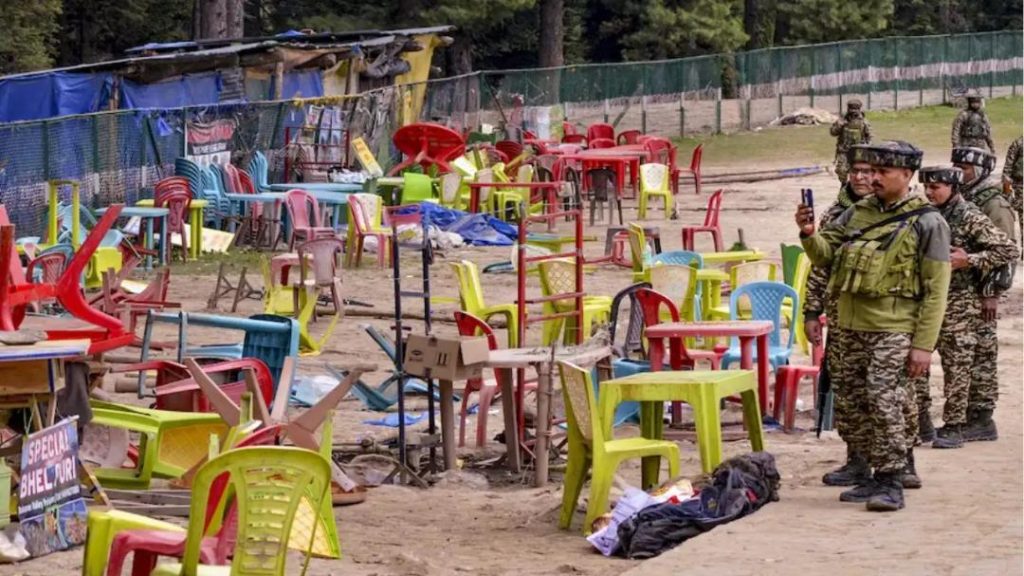
Title: This is Exactly What Happened to Us: Kashmiri Pandit on Pahalgam Terror Attack
As the news of the Pahalgam terror attack spread, it sent shockwaves across the nation. The heinous act of terrorism, in which terrorists targeted a bus carrying Hindu pilgrims in Pahalgam, left many people dead and injured. The Pakistan-backed terrorists, known for their brutal tactics, allegedly asked the victims about their religion before shooting them. This gruesome incident has left everyone stunned and raised questions about the safety of people in Kashmir.
For those who have lived through the horrors of the Kashmiri Pandit exodus in the 1990s, the Pahalgam terror attack is a painful reminder of the past. One such survivor is a Kashmiri Pandit who left Kashmir in the 1990s due to the targeted militancy sponsored by Pakistan. In an interview with Times Now, this individual shared their experiences and likened the Pahalgam terror attack to the plight of Kashmiri Pandits.
“I left Kashmir in the 1990s because of the targeted violence against us. We were forced to flee our homes, our businesses, and our lives. We were labeled as ‘traitors’ and ‘collaborators’ by the militants. The Pakistani-backed terrorists would come to our homes, identify our religion, and then shoot us. It was a brutal and inhumane act. We were forced to leave our homeland, our culture, and our identity behind,” the Kashmiri Pandit said.
The individual’s words are a stark reminder of the trauma and suffering that the Kashmiri Pandits have endured. The Pahalgam terror attack, in which terrorists targeted a bus carrying Hindu pilgrims, is a stark reminder of the same brutal tactics that were used against the Kashmiri Pandits.
The Kashmiri Pandit survivor’s words are not just a commentary on the past but also a warning for the present. “This is exactly what happened with us. Maybe this could have been avoided if the Kashmiri Pandits were taken more seriously from the beginning,” the individual said.
The Pahalgam terror attack is a stark reminder that the Pakistani-backed terrorism in Kashmir is far from over. Despite international pressure, the Pakistani government continues to support and fund the terrorist organizations in Kashmir. The Indian government’s efforts to counter the terrorism and improve the security situation in Kashmir have been hindered by the Pakistani government’s intransigence.
The Kashmiri Pandit survivor’s words are a sobering reminder of the consequences of ignoring the plight of the Kashmiri Pandits. The Pahalgam terror attack is a stark reminder that the past is not just a memory but a warning for the future. The Kashmiri Pandits were forced to flee their homeland, their culture, and their identity. If the international community and the Indian government do not take concrete steps to address the issue of terrorism in Kashmir, the Pahalgam terror attack may not be an isolated incident.
The Pahalgam terror attack is a stark reminder that the Pakistani-backed terrorism in Kashmir is not limited to the Kashmiri Pandits. The terrorists have targeted Hindu pilgrims, Muslims, and Sikhs alike. The attack is a stark reminder that the terrorists do not discriminate between religions or communities. They are driven by a singular ideology of hatred and violence.
The Kashmiri Pandit survivor’s words are a powerful reminder of the need for the international community to take concrete steps to address the issue of terrorism in Kashmir. The Pakistani government must be held accountable for its role in sponsoring and funding the terrorist organizations in Kashmir. The Indian government must take concrete steps to improve the security situation in Kashmir and ensure that the people of Kashmir feel safe and secure.
In conclusion, the Pahalgam terror attack is a stark reminder of the brutality and inhumanity of the Pakistani-backed terrorism in Kashmir. The Kashmiri Pandit survivor’s words are a powerful reminder of the need for the international community to take concrete steps to address the issue of terrorism in Kashmir. The Pahalgam terror attack is a stark reminder that the past is not just a memory but a warning for the future.
Source:






